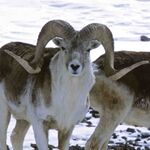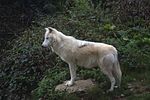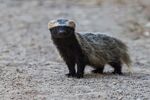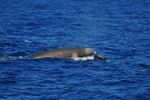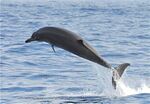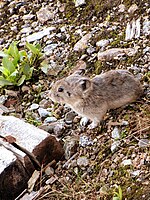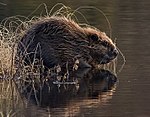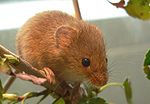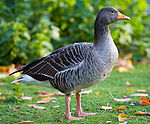Fauna of Talvistova: Difference between revisions
(→Birds) |
|||
| (32 intermediate revisions by the same user not shown) | |||
| Line 1: | Line 1: | ||
{{wip}} | {{wip}} | ||
There are _ total species in Talvistova according to the | There are _ total species in Talvistova according to the RESI. This is includes 41 species of Mammal, _ Species of Bird, 6 species of reptiles and amphibians, and _ number of fish. | ||
== Mammals == | == Mammals == | ||
| Line 8: | Line 8: | ||
{| class="wikitable" | {| class="wikitable" | ||
|- | |- | ||
! Common Name !! Scientific Name !! Photo !! | ! Common Name !! Scientific Name !! Photo !! RESI Status !! Description !! Range | ||
|- | |- | ||
!colspan="7"| Cervidae Family | !colspan="7"| Cervidae Family | ||
|- | |- | ||
| {{wp|Fallow Deer| | | {{wp|Fallow Deer|Southern Kasperi's Deer}} || Cervos Aquilo || [[File:Dama dama8.JPG|center|frameless|150px]] || [[File:LC IUCN 3 1.svg|center|Frameless]] | ||
|| 63 inches long, 33 inches tall at the shoulder. Males weigh around 220 pounds, females 100. usually roams in groups of up to 20. || lower extent of the Novorosa River to the southern border of Gilja | |||
|- | |- | ||
| {{wp|Sika Deer| | | {{wp|Sika Deer|Nothern Kasperi's Deer}} || Cervos Meridies || [[File:Cervus nippon hortulorum qtl5.jpg|center|frameless|150px]] | ||
|| [[File:LC IUCN 3 1.svg|center|Frameless]] || | || [[File:LC IUCN 3 1.svg|center|Frameless]]|| 70 inches long, 43 at the shoulder. Males commonly weigh around 240 pounds, with females around 110 pounds. Usually solitary, with large groups occurring in winter. || Orphion border to the upper extent of the Novorosa River. | ||
|- | |- | ||
| {{wp| Moose}} || Alces Alces || [[File:Moose superior.jpg|center|frameless|150px]] | | {{wp| Moose}} || Alces Alces || [[File:Moose superior.jpg|center|frameless|150px]] | ||
|| [[File:Status iucn CR icon.svg|center|frameless|25px]] || Limited parts of the Northern Border Region | || [[File:Status iucn CR icon.svg|center|frameless|25px]] || 9 feet long, 6 feet tall at the shoudler. Males weigh upwards of 1,000 pounds, and females around 800. Exclusively solitary year round. || Limited parts of the Northern Border Region | ||
|- | |- | ||
!colspan="7"| Suidae Family | !colspan="7"| Suidae Family | ||
|- | |- | ||
| {{wp|Bornean bearded pig| Wooly Boar}} || Verres Pexus || [[File:Bearded Pigs2.jpg|150px|center|frameless]] || [[File:VU IUCN 3 1.svg|center|frameless|35px]] || Found largely in the swamp-like border forests. | | {{wp|Bornean bearded pig| Wooly Boar}} || Verres Pexus || [[File:Bearded Pigs2.jpg|150px|center|frameless]] || [[File:VU IUCN 3 1.svg|center|frameless|35px]] || 60 inches long, females slightly shorter at 51 inches. 23 inches tall at the shoulder. both genders weigh around 170 pounds. Usually found in groups generally 5 people long || Found largely in the swamp-like border forests. | ||
|- | |- | ||
!colspan="7"| Bovidae Family | !colspan="7"| Bovidae Family | ||
|- | |- | ||
| {{wp| Mouflon| Kivinen | | {{wp| Mouflon| Kivinen Sheep}} || Aries Saxeus || [[File:Mouflon in zoo.jpg|150px|center|frameless]] || [[File:VU IUCN 3 1.svg|center|frameless|35px]] | ||
|| Found exclusively in the mountains of central Talvistova. | || 70 inches long, 35 inches tall at the shoulder. Males weigh around 110 pounnds, and females around 77. Generally found in groups made up of 1 male and up to 6 females. || Found exclusively in the mountains of central Talvistova. | ||
|- | |- | ||
| {{wp|argali| | | {{wp|argali| Wilhelm Sheep}} || Aries Nix || [[File:Argali-93d7f6d1bb33616d25487796ca5cbfaf (1).jpg|150px|center|frameless]] || [[File:NT IUCN 3 1.svg|center|frameless|35px]] || 8 feet long, 5 feet tall at the shoulder. Males can weigh anywhere from 214 to 700 pounds, with females ranging from 95 to 200. Generally solitary, but breeding groups do occur during rut. || Found exclusively in the mountains of central Talvistova. | ||
|- | |- | ||
| {{wp| Bharal| Western Slope | | {{wp| Bharal| Western Slope Sheep}} || Aries Declive || [[File:Pseudois nayaur.JPG|150px|center|frameless]] || [[File:CR IUCN 3 1.svg|center|frameless|35px]] || Up to 65 inches long, 36 inches tall at the shouder. Both Genders weigh around 170 pounds. || | ||
Found only on the Western slope of the Danube Mountains in the north. | Found only on the Western slope of the Danube Mountains in the north. | ||
|- | |- | ||
| Line 40: | Line 40: | ||
{| class="wikitable" | {| class="wikitable" | ||
|- | |- | ||
! Common Name !! Scientific Name !! Photo !! | ! Common Name !! Scientific Name !! Photo !! RESI Status !! Description !! Range | ||
|- | |- | ||
!colspan="7"|Canidae Family | !colspan="7"|Canidae Family | ||
|- | |- | ||
| {{wp|Mackenzie River Wolf|Alpine Wolf}} || Lupus Alpinae || [[File:Loup du Canada (Canis lupus mackenzii).JPG|150px|frameless|center]] | | {{wp|Mackenzie River Wolf|Alpine Wolf}} || Lupus Alpinae || [[File:Loup du Canada (Canis lupus mackenzii).JPG|150px|frameless|center]] | ||
|| [[File:EN IUCN 3 1.svg|center|35px]] | || [[File:EN IUCN 3 1.svg|center|35px]] || 63 inches long, 31 inches tall at the shoulder. Both genders weigh around 80 pounds. Forms packs of up to 12. | ||
|| Found exclusive in the mountains of central Talvistova | || Found exclusive in the mountains of central Talvistova | ||
|- | |- | ||
| {{wp|Eastern Wolf|Pine Wolf}} || Lupus Pinus || [[File:Eastern-wolf.jpg|150px|frameless|center]] | | {{wp|Eastern Wolf|Pine Wolf}} || Lupus Pinus || [[File:Eastern-wolf.jpg|150px|frameless|center]] | ||
|| [[File:EN IUCN 3 1.svg|center|35px]] | || [[File:EN IUCN 3 1.svg|center|35px]] || 63 inches long, 31 inches tall at the shoulder. Both genders weigh around 80 pounds. Forms packs of up to 12. Once thought to be it's own species, but was instead determined to be a subspecies of the Alpine wolf. | ||
|| Found primarily in the woods of northern talvistova, but is also known to end up as far south as Skalgaard. | || Found primarily in the woods of northern talvistova, but is also known to end up as far south as Skalgaard. | ||
|- | |- | ||
| {{wp|African Wild Dog|Painted Wolf}} || Lupus Picta || [[File:African wild dog (Lycaon pictus pictus).jpg|150px|frameless|center]] | | {{wp|African Wild Dog|Painted Wolf}} || Lupus Picta || [[File:African wild dog (Lycaon pictus pictus).jpg|150px|frameless|center]] | ||
|| [[File:EW IUCN 3 1.svg|35px|center]] | || [[File:EW IUCN 3 1.svg|35px|center]] | ||
|| Originally found all over the Northern half of the country, but now only 6 breeding pairs are currently housed at the Mill Zoology Center. | || 44 inches long, 31 inches tall at the shoulder. Males generally weigh in at 72 pounds, and Females at 54 pounds. Live in Family units up to 6 members strong. || Originally found all over the Northern half of the country, but now only 6 breeding pairs are currently housed at the Mill Zoology Center. | ||
|- | |- | ||
| {{wp|Darwin's Fox|Western Fox}} || Vulpes Occidens || [[File:Pseudalopex fulvipes-primer plano.jpg|150px|frameless|center]] | | {{wp|Darwin's Fox|Western Fox}} || Vulpes Occidens || [[File:Pseudalopex fulvipes-primer plano.jpg|150px|frameless|center]] | ||
|| [[File:LC IUCN 3 1.svg|35px|center]] | || [[File:LC IUCN 3 1.svg|35px|center]] | ||
|| Found all over the country, even down into the big cities, where it scavenges garbage. | || 31 inches long. Males weigh up to 25 pounds, and Females up to 13. Lives in family units up to 4. || Found all over the country, even down into the big cities, where it scavenges garbage. | ||
|- | |- | ||
| {{wp|Crab-Eating Fox|Crab Eater Fox}} || Vulpes Cancer || [[File:Crab-eating Fox.JPG|150px|frameless|center]] | | {{wp|Crab-Eating Fox|Crab Eater Fox}} || Vulpes Cancer || [[File:Crab-eating Fox.JPG|150px|frameless|center]] | ||
|| [[File:EN IUCN 3 1.svg|center|35px]] | || [[File:EN IUCN 3 1.svg|center|35px]] | ||
|| Found mainly on the coast. | || Length reaches up to 25 inches, and can weigh up to 17 pounds. Generally solitary except during breeding season. || Found mainly on the coast. | ||
|- | |- | ||
!colspan="7"| Felidae Family | !colspan="7"| Felidae Family | ||
| Line 68: | Line 68: | ||
| {{wp|Eurasian Lynx|Strommen's Lynx}} || Lynx Strommenii || [[File:Lynx lynx2.jpg|150px|frameless|center]] | | {{wp|Eurasian Lynx|Strommen's Lynx}} || Lynx Strommenii || [[File:Lynx lynx2.jpg|150px|frameless|center]] | ||
|| [[File:CR IUCN 3 1.svg|center|35px]] | || [[File:CR IUCN 3 1.svg|center|35px]] | ||
|| Found in the Mountainous forests of central Talvistova | || 51 inches long, 28 inches tall at the shoulder. Males weigh between 40 to 68 pounds, with females never exceeding 40. Solitary. || Found in the Mountainous forests of central Talvistova | ||
|- | |- | ||
!colspan="7"|Mustelidae Family | !colspan="7"|Mustelidae Family | ||
|- | |- | ||
| {{wp|American Badger|Corentian Badger}} || Melis Corentii || [[File:Taxidea taxus (Point Reyes, 2007).jpg|150px|frameless|center]] | | {{wp|American Badger|Corentian Badger}} || Melis Corentii || [[File:Taxidea taxus (Point Reyes, 2007).jpg|150px|frameless|center]] | ||
|| [[File: LC IUCN 3 1.svg|center|35px]] || Found mostly in the foothills of the mountains across Talvistova. | || [[File: LC IUCN 3 1.svg|center|35px]] || 24 to 30 inches long. Males can weigh up to 19 pounds, and females up to 14. || Found mostly in the foothills of the mountains across Talvistova. | ||
|- | |- | ||
| {{wp|Wolverine}} || Gulo Gulo || [[File:Wolverine 01.jpg|150px|frameless|center]] | | {{wp|Wolverine}} || Gulo Gulo || [[File:Wolverine 01.jpg|150px|frameless|center]] | ||
|| [[File: EN IUCN 3 1.svg|center|35px]] || Found mostly in the border forests of Northern Talvistova | || [[File: EN IUCN 3 1.svg|center|35px]]|| 26 to 42 inches long, and weighs anywhere from 12 to 55 pounds, but exceptional specimens have been measured up to 77. Solitary except during breeding season. || Found mostly in the border forests of Northern Talvistova | ||
|- | |- | ||
| {{wp| Greater Grison}} || Galictis vittata || [[File:Greater grison.jpg|150px|frameless|center]] | | {{wp| Greater Grison}} || Galictis vittata || [[File:Greater grison.jpg|150px|frameless|center]] | ||
|| [[File: NT IUCN 3 1.svg|center|35px]] || Found also mainly in the foothills of Talvistova. | || [[File: NT IUCN 3 1.svg|center|35px]]|| 18 to 24 inches long, and weighs anywhere from 3.5 to 8.5 pounds. They live in breeding pairs, and mate for life. || Found also mainly in the foothills of Talvistova. | ||
|- | |- | ||
| {{wp|Lesser Grison}} || Galictis cuja || [[File:6154087815 867019142e b.jpg|150px|frameless|center]] | | {{wp|Lesser Grison}} || Galictis cuja || [[File:6154087815 867019142e b.jpg|150px|frameless|center]] | ||
|| [[File: NT IUCN 3 1.svg|center|35px]] || Found in the coastal and urban areas of the country. | || [[File: NT IUCN 3 1.svg|center|35px]] || 10 to 20 inches in length, and anywhere from 2.5 to 5 pounds. Lives in family units of up to 5. || Found in the coastal and urban areas of the country. | ||
|- | |- | ||
!colspan="7"| Phocidae Family | !colspan="7"| Phocidae Family | ||
|- | |- | ||
| {{wp|Southern Elephant Seal}} || Mirounga leonina || [[File:Mating scene with elevated Alpha Male. Elephant Seals of Piedras Blancas.jpg|150px|frameless|center]] || [[File: LC IUCN 3 1.svg|center|35px]] || Found on the northern waters and beaches, all the way into the Belantican Sea | | {{wp|Southern Elephant Seal}} || Mirounga leonina || [[File:Mating scene with elevated Alpha Male. Elephant Seals of Piedras Blancas.jpg|150px|frameless|center]] || [[File: LC IUCN 3 1.svg|center|35px]]|| Bulls grow anywhere from 14 to 19 feet long, and weigh up to 9,000 pounds, whereas females measure in up to 10 feet in length, and can weigh up to 2,000 pounds. Generally solitary, and forms harems during mating season. || Found on the northern waters and beaches, all the way into the Belantican Sea | ||
|- | |- | ||
| {{wp| Ribbon Seal}} || Histriophoca fasciata || [[File:Male Ribbon Sea Ozernoy Gulf Russia.jpg|150px|frameless|center]] || [[File: NT IUCN 3 1.svg|center|35px]] || Found in the southern seas and icepacks around Talvistova. | | {{wp| Ribbon Seal}} || Histriophoca fasciata || [[File:Male Ribbon Sea Ozernoy Gulf Russia.jpg|150px|frameless|center]] || [[File: NT IUCN 3 1.svg|center|35px]] || Grows up to 5.2 feet long, and weighs up to 200 pounds. Generally solitary, and forms large breeding herds during mating season. || Found in the southern seas and icepacks around Talvistova. | ||
|- | |- | ||
!colspan="7"|Ursidae Family | !colspan="7"|Ursidae Family | ||
|- | |- | ||
| {{wp| Brown Bear}} || Ursus Arctos || [[File:Kamchatka Brown Bear near Dvuhyurtochnoe on 2015-07-23.jpg|150px|frameless|center]] || [[File: EN IUCN 3 1.svg|center|35px]] || Found from the norther border to the central mountain ranges. | | {{wp| Brown Bear}} || Ursus Arctos || [[File:Kamchatka Brown Bear near Dvuhyurtochnoe on 2015-07-23.jpg|150px|frameless|center]] || [[File: EN IUCN 3 1.svg|center|35px]]|| Anywhere in length from 5 to 9 feet, males weigh up to 478 pounds, while females weigh up to 335 pounds. Males are generally solitary, and females generally stay in family units with their cubs until they reach maturity. || Found from the norther border to the central mountain ranges. | ||
|} | |} | ||
| Line 99: | Line 99: | ||
{| class="wikitable" | {| class="wikitable" | ||
|- | |- | ||
! Common Name !! Scientific Name !! Photo !! | ! Common Name !! Scientific Name !! Photo !! RESI Status !! Description !! Range | ||
|- | |- | ||
!colspan="7"| Balaenopteroidae Family | !colspan="7"| Balaenopteroidae Family | ||
|- | |- | ||
| {{wp|Sei Whale}} || Balaenopteroidea Borealis || [[File:Sei whale mother and calf Christin Khan NOAA.jpg|150px|frameless|center]] | | {{wp|Sei Whale}} || Balaenopteroidea Borealis || [[File:Sei whale mother and calf Christin Khan NOAA.jpg|150px|frameless|center]] | ||
|| [[File: EN IUCN 3 1.svg|center|35px]] || Found all | || [[File: EN IUCN 3 1.svg|center|35px]] || Reaches up to 64 feet long, and weighs up to 28 tons. Roams in pods of up to 5. || Found in all oceans, but generally avoids tropical waters whenever possible. Breeds and rears young in the arctic waters of Talvistova. | ||
|- | |- | ||
| {{wp|Minke Whale}} || Balaenoptera acutorostrata || [[File:Minke Whale (NOAA).jpg|150px|frameless|center]] | | {{wp|Minke Whale}} || Balaenoptera acutorostrata || [[File:Minke Whale (NOAA).jpg|150px|frameless|center]] | ||
|| [[File: CR IUCN 3 1.svg|center|35px]] || | || [[File: CR IUCN 3 1.svg|center|35px]] || Reaches anywhere from 20 to 28 feet, and weighs up to 5 tons. Generally roams in groups of 3, although larger groups are formed when migrating. || Global. Breeds in the Gulf of Paajarvi. | ||
|- | |- | ||
!colspan="7"| Delphinidae Family | !colspan="7"| Delphinidae Family | ||
|- | |- | ||
| {{wp|Commerson's Dolphin|Tuxedo Dolphin}} || Balaena Pumilus Talvistovii || [[File:Commdolph01.jpg|150px|frameless|center]] | | {{wp|Commerson's Dolphin|Tuxedo Dolphin}} || Balaena Pumilus Talvistovii || [[File:Commdolph01.jpg|150px|frameless|center]] | ||
|| [[File: EN IUCN 3 1.svg|center|35px]] || Found in the coastal areas around Talvistova. | || [[File: EN IUCN 3 1.svg|center|35px]] || Generally 5 feet long. Can weigh anywhere from 75 to 150 pounds. A mature female caught off the coast of the Talistovan Lapland was 4.5 Feet long and 51 pounds, making it the smallest cetacean on record. || Found in the coastal areas around Talvistova. | ||
|- | |- | ||
!colspan="7"| Phocoenidae Family | !colspan="7"| Phocoenidae Family | ||
|- | |- | ||
| {{wp|Spectacled Porpoise}} || Phocoena dioptrica || [[File:Porpoise.org-adopt-a-spectacled-porpoise-spectacled-porpoise-promo.jpg|150px|frameless|center]] || [[File: | | {{wp|Spectacled Porpoise}} || Phocoena dioptrica || [[File:Porpoise.org-adopt-a-spectacled-porpoise-spectacled-porpoise-promo.jpg|150px|frameless|center]] || [[File: DD IUCN 3 1.svg|center|35px]] || Very little is known about this species, as it was just described as a species in 2003. || Found in the Arctic Ocean and the coastal areas around the country. | ||
|- | |- | ||
!colspan="7"| Ziphiidae Family | !colspan="7"| Ziphiidae Family | ||
|- | |- | ||
| {{wp|Shepherd's Beaked Whale| | | {{wp|Shepherd's Beaked Whale| Johannesson's Beaked Whale}} || Tasmacetus Ephesii || [[File:Antarctic.jpg|150px|frameless|center]] | ||
|| [[File: CR IUCN 3 1.svg|center|35px]] || Found in the | || [[File: CR IUCN 3 1.svg|center|35px]] || Adults range anywhere from 20 to 23 feet, and can weigh upwards of 3 and a half tons. || Found in the arctic waters north of Talvistova. | ||
|- | |- | ||
| {{wp|Sowerby's Beaked Whale| | | {{wp|Sowerby's Beaked Whale| Northern Sea Whale}} || Tasmacetus Belanticii || [[File:7977293321 f424c1e8bb b.jpg|150px|frameless|center]] | ||
|| [[File: EN IUCN 3 1.svg|center|35px]] || Found in the | || [[File: EN IUCN 3 1.svg|center|35px]] || Reach up to 16 feet, and anywhere from 1 to 1.5 tons. || Found in the sea to the East of Talvistova | ||
|} | |} | ||
| Line 132: | Line 132: | ||
{| class="wikitable" | {| class="wikitable" | ||
|- | |- | ||
! Common Name !! Scientific Name !! Photo !! | ! Common Name !! Scientific Name !! Photo !! RESI Status !! Range | ||
|- | |- | ||
!colspan="7"| Ochotonidae Family | !colspan="7"| Ochotonidae Family | ||
| Line 155: | Line 155: | ||
{| class="wikitable" | {| class="wikitable" | ||
|- | |- | ||
! Common Name !! Scientific Name !! Photo !! | ! Common Name !! Scientific Name !! Photo !! RESI Status !! Range | ||
|- | |- | ||
!colspan="7"| Castoridae Family | !colspan="7"| Castoridae Family | ||
| Line 190: | Line 190: | ||
== Birds == | == Birds == | ||
===== Ducks, Geese, and Waterfowl ===== | |||
{| class="wikitable" | |||
|- | |||
! Common Name !! Scientific Name !! Photo !! NESI Status !! Description | |||
|- | |||
| Sooty Goose || Anser anser || [[File:Greylag Goose - St James's Park, London - Nov 2006.jpg|150px|center|frameless]] || [[File:LC IUCN 3 1.svg|center|35px]] || Example | |||
|- | |||
| Example || Example || Example || Example || Example | |||
|- | |||
| Example || Example || Example || Example || Example | |||
|} | |||
== Reptiles and Amphibians == | == Reptiles and Amphibians == | ||
===== Reptiles ===== | |||
{| class="wikitable" | |||
|- | |||
! Common Name !! Scientific Name !! Photo !! RESI Status !! Range | |||
|- | |||
| {{wp|Vipera berus|Common Adder}} || Vipera Communia || [[File:Benny Trapp Vipera berus.jpg|150px|center]] || [[File: LC IUCN 3 1.svg|35px|center]] || Indigenous to the northern forests. | |||
|- | |||
| {{wp|Grass Snake|Frog-Eating Snake}} || Serpens Ranae Comedenti || [[File:Natrix natrix (Marek Szczepanek).jpg|150px|center]] || [[File: EN IUCN 3 1.svg|35px|center]] || found usually around rivers in the north. | |||
|- | |||
| {{wp|Viviparous lizard}} || Zootoca vivipara || [[File:Common (viviparous) lizard (zootoca vivipara).jpg|150px|center]] || [[File: EW IUCN 3 1.svg|35px|center]] || used to be all over the Northern half, but predation has led to the only breeding pair left being in the Mill Zoology Center. | |||
|- | |||
|} | |||
===== Amphibians ===== | |||
{| class="wikitable" | |||
|- | |||
! Common Name !! Scientific Name !! Photo !! RESI Status !! Range | |||
|- | |||
| {{wp|Common Toad}} || Bufo Bufo || [[File:Bufo bufo sitting-Iric2006.jpg|150px|center]] || [[File: LC IUCN 3 1.svg|35px|center]] || Indigenous to the rivers and ponds of the Northern Forests. | |||
|- | |||
| {{wp|Natterjack Toad|Natterjack}} || Epidalea calamita || [[File:Bufo calamita (Marek Szczepanek).jpg|150px|center]] || [[File: LC IUCN 3 1.svg|35px|center]] || found usually around rivers in the north. | |||
|- | |||
| {{wp|Moor Frog}} || Rana arvalis || [[File:RanaArvalisFemale.jpg|150px|center]] || [[File: LC IUCN 3 1.svg|35px|center]] || Found near almost every body of water in Talvistova. | |||
|} | |||
== Fish == | == Fish == | ||
Latest revision as of 02:03, 24 July 2020
This article is incomplete because it is pending further input from participants, or it is a work-in-progress by one author. Please comment on this article's talk page to share your input, comments and questions. Note: To contribute to this article, you may need to seek help from the author(s) of this page. |
There are _ total species in Talvistova according to the RESI. This is includes 41 species of Mammal, _ Species of Bird, 6 species of reptiles and amphibians, and _ number of fish.
Mammals
Even Toed Ungulates
Even-toed ungulates are members of the order Artiodactyla. The even-toed ungulates are ungulates whose weight is borne about equally by the third and fourth toes, rather than mostly or entirely by the third as in odd-toed ungulates.
| Common Name | Scientific Name | Photo | RESI Status | Description | Range | |
|---|---|---|---|---|---|---|
| Cervidae Family | ||||||
| Southern Kasperi's Deer | Cervos Aquilo | 63 inches long, 33 inches tall at the shoulder. Males weigh around 220 pounds, females 100. usually roams in groups of up to 20. | lower extent of the Novorosa River to the southern border of Gilja | |||
| Nothern Kasperi's Deer | Cervos Meridies | 70 inches long, 43 at the shoulder. Males commonly weigh around 240 pounds, with females around 110 pounds. Usually solitary, with large groups occurring in winter. | Orphion border to the upper extent of the Novorosa River. | |||
| Moose | Alces Alces | 9 feet long, 6 feet tall at the shoudler. Males weigh upwards of 1,000 pounds, and females around 800. Exclusively solitary year round. | Limited parts of the Northern Border Region | |||
| Suidae Family | ||||||
| Wooly Boar | Verres Pexus | 60 inches long, females slightly shorter at 51 inches. 23 inches tall at the shoulder. both genders weigh around 170 pounds. Usually found in groups generally 5 people long | Found largely in the swamp-like border forests. | |||
| Bovidae Family | ||||||
| Kivinen Sheep | Aries Saxeus | 70 inches long, 35 inches tall at the shoulder. Males weigh around 110 pounnds, and females around 77. Generally found in groups made up of 1 male and up to 6 females. | Found exclusively in the mountains of central Talvistova. | |||
| Wilhelm Sheep | Aries Nix | 8 feet long, 5 feet tall at the shoulder. Males can weigh anywhere from 214 to 700 pounds, with females ranging from 95 to 200. Generally solitary, but breeding groups do occur during rut. | Found exclusively in the mountains of central Talvistova. | |||
| Western Slope Sheep | Aries Declive | Up to 65 inches long, 36 inches tall at the shouder. Both Genders weigh around 170 pounds. |
Found only on the Western slope of the Danube Mountains in the north. | |||
Carnivorans
| Common Name | Scientific Name | Photo | RESI Status | Description | Range | |
|---|---|---|---|---|---|---|
| Canidae Family | ||||||
| Alpine Wolf | Lupus Alpinae | 63 inches long, 31 inches tall at the shoulder. Both genders weigh around 80 pounds. Forms packs of up to 12. | Found exclusive in the mountains of central Talvistova | |||
| Pine Wolf | Lupus Pinus | 63 inches long, 31 inches tall at the shoulder. Both genders weigh around 80 pounds. Forms packs of up to 12. Once thought to be it's own species, but was instead determined to be a subspecies of the Alpine wolf. | Found primarily in the woods of northern talvistova, but is also known to end up as far south as Skalgaard. | |||
| Painted Wolf | Lupus Picta | 44 inches long, 31 inches tall at the shoulder. Males generally weigh in at 72 pounds, and Females at 54 pounds. Live in Family units up to 6 members strong. | Originally found all over the Northern half of the country, but now only 6 breeding pairs are currently housed at the Mill Zoology Center. | |||
| Western Fox | Vulpes Occidens | 31 inches long. Males weigh up to 25 pounds, and Females up to 13. Lives in family units up to 4. | Found all over the country, even down into the big cities, where it scavenges garbage. | |||
| Crab Eater Fox | Vulpes Cancer | Length reaches up to 25 inches, and can weigh up to 17 pounds. Generally solitary except during breeding season. | Found mainly on the coast. | |||
| Felidae Family | ||||||
| Strommen's Lynx | Lynx Strommenii | 51 inches long, 28 inches tall at the shoulder. Males weigh between 40 to 68 pounds, with females never exceeding 40. Solitary. | Found in the Mountainous forests of central Talvistova | |||
| Mustelidae Family | ||||||
| Corentian Badger | Melis Corentii | 24 to 30 inches long. Males can weigh up to 19 pounds, and females up to 14. | Found mostly in the foothills of the mountains across Talvistova. | |||
| Wolverine | Gulo Gulo | 26 to 42 inches long, and weighs anywhere from 12 to 55 pounds, but exceptional specimens have been measured up to 77. Solitary except during breeding season. | Found mostly in the border forests of Northern Talvistova | |||
| Greater Grison | Galictis vittata | 18 to 24 inches long, and weighs anywhere from 3.5 to 8.5 pounds. They live in breeding pairs, and mate for life. | Found also mainly in the foothills of Talvistova. | |||
| Lesser Grison | Galictis cuja | 10 to 20 inches in length, and anywhere from 2.5 to 5 pounds. Lives in family units of up to 5. | Found in the coastal and urban areas of the country. | |||
| Phocidae Family | ||||||
| Southern Elephant Seal | Mirounga leonina | Bulls grow anywhere from 14 to 19 feet long, and weigh up to 9,000 pounds, whereas females measure in up to 10 feet in length, and can weigh up to 2,000 pounds. Generally solitary, and forms harems during mating season. | Found on the northern waters and beaches, all the way into the Belantican Sea | |||
| Ribbon Seal | Histriophoca fasciata | Grows up to 5.2 feet long, and weighs up to 200 pounds. Generally solitary, and forms large breeding herds during mating season. | Found in the southern seas and icepacks around Talvistova. | |||
| Ursidae Family | ||||||
| Brown Bear | Ursus Arctos | Anywhere in length from 5 to 9 feet, males weigh up to 478 pounds, while females weigh up to 335 pounds. Males are generally solitary, and females generally stay in family units with their cubs until they reach maturity. | Found from the norther border to the central mountain ranges. | |||
Cetaceans
The order Cetacea includes whales, dolphins and porpoises. They are the mammals most fully adapted to aquatic life with a spindle-shaped nearly hairless body, protected by a thick layer of blubber, and forelimbs and tail modified to provide propulsion underwater.
| Common Name | Scientific Name | Photo | RESI Status | Description | Range | |
|---|---|---|---|---|---|---|
| Balaenopteroidae Family | ||||||
| Sei Whale | Balaenopteroidea Borealis | Reaches up to 64 feet long, and weighs up to 28 tons. Roams in pods of up to 5. | Found in all oceans, but generally avoids tropical waters whenever possible. Breeds and rears young in the arctic waters of Talvistova. | |||
| Minke Whale | Balaenoptera acutorostrata | Reaches anywhere from 20 to 28 feet, and weighs up to 5 tons. Generally roams in groups of 3, although larger groups are formed when migrating. | Global. Breeds in the Gulf of Paajarvi. | |||
| Delphinidae Family | ||||||
| Tuxedo Dolphin | Balaena Pumilus Talvistovii | Generally 5 feet long. Can weigh anywhere from 75 to 150 pounds. A mature female caught off the coast of the Talistovan Lapland was 4.5 Feet long and 51 pounds, making it the smallest cetacean on record. | Found in the coastal areas around Talvistova. | |||
| Phocoenidae Family | ||||||
| Spectacled Porpoise | Phocoena dioptrica | Very little is known about this species, as it was just described as a species in 2003. | Found in the Arctic Ocean and the coastal areas around the country. | |||
| Ziphiidae Family | ||||||
| Johannesson's Beaked Whale | Tasmacetus Ephesii | Adults range anywhere from 20 to 23 feet, and can weigh upwards of 3 and a half tons. | Found in the arctic waters north of Talvistova. | |||
| Northern Sea Whale | Tasmacetus Belanticii | Reach up to 16 feet, and anywhere from 1 to 1.5 tons. | Found in the sea to the East of Talvistova | |||
Lagomorphs
The lagomorphs comprise two families, Leporidae (hares and rabbits), and Ochotonidae (pikas). Though they can resemble rodents, and were classified as a superfamily in that order until the early 20th century, they have since been considered a separate order. They differ from rodents in a number of physical characteristics, such as having four incisors in the upper jaw rather than two.
| Common Name | Scientific Name | Photo | RESI Status | Range | ||
|---|---|---|---|---|---|---|
| Ochotonidae Family | ||||||
| Alpine pika | Ochotona alpina |  |
Found Primarily in the Central Mountain Ranges | |||
| Danube Pika | Ochotona Danuvius | Found exclusively in the Danube Mountains. | ||||
| Coal Pika | Ochotona Nigreos | Found in regions where coal was historically mined, that being the provinces of Djuga and Gilja. | ||||
| Kaiser Pika | Ochotona Caesar | Found all over the country. | ||||
| Leporidae Family | ||||||
| Snowshoe Hare | Lepus americanus | Found in the border forests. | ||||
Rodents
Rodents are members of the order Rodentia. Rodents make up the largest order of mammals, with over 40 percent of mammalian species. They have two incisors in the upper and lower jaw which grow continually and must be keep short by gnawing.
| Common Name | Scientific Name | Photo | RESI Status | Range | ||
|---|---|---|---|---|---|---|
| Castoridae Family | ||||||
| Corentian Beaver | Castor Corentii | Found in the Various rivers of Northern Talvistova | ||||
| Cricetidae Family | ||||||
| Muskrat | Ondatra zibethicus | Found along the banks of the northern rivers. | ||||
| Tundra Vole | Microtus oeconomus | Found mostly in the mountains, but in recent years has been spotted as far south as the Ljustad. | ||||
| Muridae Family | ||||||
| Yellow-necked mouse | Apodemus flavicollis | Found mostly in suburban neighborhoods due to being pushed out of Urban areas by larger rodents. | ||||
| wood mouse | Apodemus sylvaticus |
Found on almost the entirity of the Country. | ||||
| Grain Mouse | Apodemus Grano | Found in the northern food producing provinces. | ||||
| Wharf Rat | Rattus norvegicus | Found in most urban places, especially ljustad. | ||||
| Sciuridae Family | ||||||
| Carolean Gray Squirrel | Sciurus carolinensis | Found in several forests around the country, but has recently begun moving southward into the major cities. | ||||
| Tassle Ear Squirrel | Sciurus aberti kaibabensis | Found mostly in northern forests and Kvingannes. | ||||
| Rockchuck | Marmota flaviventris | Found almost exclusively in the mountains. | ||||
Birds
Ducks, Geese, and Waterfowl
| Common Name | Scientific Name | Photo | NESI Status | Description |
|---|---|---|---|---|
| Sooty Goose | Anser anser | Example | ||
| Example | Example | Example | Example | Example |
| Example | Example | Example | Example | Example |
Reptiles and Amphibians
Reptiles
| Common Name | Scientific Name | Photo | RESI Status | Range |
|---|---|---|---|---|
| Common Adder | Vipera Communia | Indigenous to the northern forests. | ||
| Frog-Eating Snake | Serpens Ranae Comedenti | found usually around rivers in the north. | ||
| Viviparous lizard | Zootoca vivipara | used to be all over the Northern half, but predation has led to the only breeding pair left being in the Mill Zoology Center. |
Amphibians
| Common Name | Scientific Name | Photo | RESI Status | Range |
|---|---|---|---|---|
| Common Toad | Bufo Bufo | Indigenous to the rivers and ponds of the Northern Forests. | ||
| Natterjack | Epidalea calamita | found usually around rivers in the north. | ||
| Moor Frog | Rana arvalis | Found near almost every body of water in Talvistova. |





